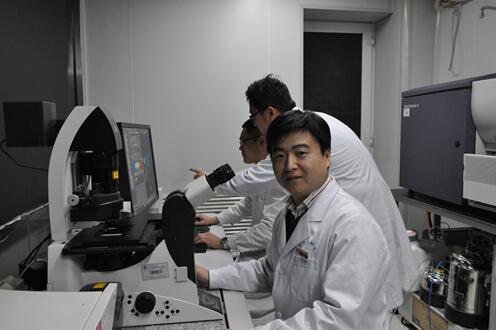
李可,男,1977年8月出生,医学博士,西安交通大学首批青年拔尖人才支持计划(A类)入选者,医学部光华特聘教授,博士生导师,第二附属医院科研实验中心主任,陕西省生物治疗与转化医学工程研究中心副主任。主要致力于固有免疫系统对获得性免疫的调控研究,尤其是补体系统对各种免疫细胞功能的调节,以及补体在感染、肾脏疾病、肿瘤、自身免疫性疾病中的作用研究。现兼任英国伦敦国王学院荣誉讲师,国际补体学会会员,国际肾脏病学会会员,英国肾脏病学会会员, 英国移植学会会员;担任多种免疫学/肾病学国际期刊审稿人。主持国家自然科学基金3项,获得教育部新世纪优秀人才计划(2011)以及霍英东青年教师基金资助(2012)。获得西安交通大学杰青培育计划、西安交通大学医学院光华青年学者基金各1项,参与“教育部985“三期”项目1项,在研科研经费超过300万元。已发表SCI论文25篇(第一或通讯作者13篇),H因子16分,影响因子总计130余分;论文被SCI期刊引用580余次。其中单篇最高引用率为80 次, 有11篇论文的SCI引用率大于25次。(Researcher ID O-6291-2014)
个人简历:
2000年毕业于重庆医科大学临床医学系,2000年9月赴英国伦敦国王学院盖斯-圣托马斯医院肾病及移植免疫实验室访问学习,2001年至2005年任国王学院研究助理,2006年9月获伦敦大学临床免疫学博士学位。2005年至2007年在伦敦国王学院从事博士后研究,2007年至2010年任医学研究理事会(MRC)移植及转化医学中心研究员、2010年起作为博士生导师在伦敦大学指导博士生。2011年3月回国,在西安交通大学医学院第二附属医院科研实验中心工作至今。
研究方向(招生方向为免疫学、肾脏病学、肿瘤学)
1. 补体系统对各种免疫细胞功能的调节;
2. 补体与肾脏疾病;
3. 补体与心血管系统疾病;
4. 补体系统与肿瘤免疫;
5. 补体系统与自身免疫疾病。
实验室介绍:
二附院科研实验中心已具备较完善的仪器平台和实验技术平台。所占面积500m2,包括:分子生物学室、细胞培养室、免疫组化室、分析室、动物处置室、清洗室、试剂准备室、标本储藏室等九间实验室。总投资近2000万元,进口仪器有流式细胞分选仪、流式细胞检测仪、小动物活体成像系统、激光共聚焦系统、磁珠分选系统、病理玻片扫描系统、实时定量PCR仪等30余台/套,可进行细胞培养、免疫组化、功能分析等多项实验研究。此外,课题组注重与国际著名实验室开展交流合作,已与英国伦敦国王学院、剑桥桑格中心以及美国哈佛医学院、休斯顿安德森肿瘤中心建立交流访问制度,定期邀请国外专家来院指导,同时选派优秀人员赴国外实验室工作,联合培养研究生。
English Version:
My major interest has been focused on investigating the cellular and molecular mechanisms by which the complement system modulates immune cells function and contributes to the pathogenesis of immune diseases [e.g. renal injury, vascular diseases, autoimmune diseases and cancer].
PhD and Research Fellow at King’s College London (2000-2010):
My PhD and post-doc (2000-2010, in KCL) study has been focused on investigating the cellular and molecular mechanisms by which complement contributes to the pathogenesis of renal diseases [i.e. infection, ischemia/reperfusion injury and transplant rejection]. I have led or actively participated in several research projects, the major contributions of those studies to the field include: 1) first reported that complement is an important regulator for the function of antigen presenting cells and renal tubular epithelial cells to stimulate antigen specific T cell responses, which contributes to renal transplant rejection; 2) revealed novel mechanisms by which uropathogenic E coli utilize the complement receptors to invade renal tubular epithelial cells; 3) described the role of complement anaphylatoxin receptors in the pathogenesis of ischemia/reperfusion injury and revealed the involved cellular and molecular mechanisms. In this period, our research has led 18 (SCI) publications (total impact factor: 120, total SCI journal citation: 501), including in Blood (2006, 2008a and b), JASN (2004, 2010, 2012), JI (2006a,b, 2009). For 8 of those publications (total impact factor: 43), I am the leading author.
PI at Xi’an Jiaotong University (2011-date)
In 2011, I was appointed as a GuangHua Distinguished Professor of Xi’an Jiaotong University and recruited back to China. My current and future work builds on the hypothesis that complement anaphylatoxin receptors (C3aR, C5aR, C5L2) exert distinct functions in regulating inflammatory responses which differentially regulating tissue repair and adaptive immune responses. I plan to test this hypothesis in different animal disease models (i.e. renal injury & fibrosis, arthrosclerosis and cancer progression). Currently, I lead a research team with 3 Post-Docs, 6 PhD students and 5 technicians. The newly-formed research team has already obtained several research grants from national funding scheme (i.e. NSFC, Ministry of Education) (see below), worth a total of RMB 6,500,000 ($ 1.1M).
Contact information:
Ken Li MB,PhD.
Professor/Director
Core Research Laboratory
The Second Affiliated Hospital,
Xi’an Jiaotong University
Tel; 86-29-87678329
ke.li@mail.xjtu.edu.cn
论文代表作:
1. Choudhry N, Li K*, Zhang T, et al. The complement factor 5a receptor 1 has a pathogenic role in chronic inflammation and renal fibrosis in a murine model of chronic pyelonephritis. Kidney international 2016; 90: 540-554. (共同第一/通讯作者)
2. Wei Y, Li K*, Wang N, Cai G, Zhang T, Lin Y, Gui B, Liu E, Li Z, and Zhou W. Activation of endogenous anti-inflammatory mediator cyclic AMP attenuates acute pyelonephritis in mice induced by uropathogenic Escherichia coli. Am J Pathol. 2015 185(2):472-84.(通讯作者)
3. Min X, Liu C, Wei Y, Wang N, Yuan G, Liu D, Li Z, Zhou W, Li K*. Expression and regulation of complement receptors by human natural killer cells. Immunobiology. 2014, 219 (9):671-9. (通讯作者)
4. Li K, Zhou W. Anaphylatoxins in organ transplantation. Semin Immunol. 2013, 25:20-8.
5. Peng Q, Li K, Smyth LA, Xing G, Wang N, Meader L, Lu B, Sacks SH, Zhou W. C3a and C5a promote renal ischemia-reperfusion injury. J Am Soc Nephrol. 2012, 23(9):1474-85.
6. Li K, Anderson KJ, Peng Q, Noble A, Lu B, Kelly AP, Wang N, Sacks SH, Zhou W. Cyclic AMP plays a critical role in C3a-receptor mediated regulation of dendritic cells in antigen uptake and T cell stimulation. Blood. 2008, 112(13):5084-94.
7. Peng Q, Li K, Anderson K., Lu B., Smith RA., Sacks S.H., and Zhou W. Local production and activation of complement up-regulates the allostimulatory function of dendritic cells through C3a-C3aR interaction. Blood. 2008, 111(4):2452-61.
8. Li K, Patel H, Farrar CA, Hargreaves RE, Sacks SH and Zhou W. Complement activation regulates the capacity of proximal tubular epithelial cell to stimulate alloreactive T cell response. J Am Soc Nephrol. 2004, 15: 2414-2422.
9. Li K, Sacks S.H. and Sheerin N.S. CD46 (Membrane Cofactor Protein) acts as a human epithelial cell receptor for internalisation of opsonised uropathogenic E. coli. J Immunol. 2006, 177(4):2543-51.
联系方式:
联系电话:029-8767 8329
Email: ke.li@mail.xjtu.edu.cn
联系地址:西安市西五路157号 西安交通大学第二附属医院南院 科研实验中心

